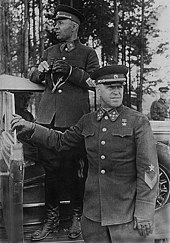User:Douglian30/sandbox/Zhukov
Pre-war military exercises
[edit]
In the autumn of 1940, Zhukov started preparing plans for the military exercise concerning the defence of the Western border of the Soviet Union. It had been pushed further to the west after the Soviet Union annexed eastern Poland and the Baltic republics.[1] In his memoirs, Zhukov reports that in this exercise, he commanded the Western or Blue forces—the supposed invasion troops—and his opponent was Colonel General Dmitry Pavlov, the commander of the Eastern or Red forces –the supposed Soviet troops. He noted that Blue had 60 divisions, while Red had 50 divisions. Zhukov describes the exercise as being similar to events that later took place during the German invasion.[2]
Russian historian Bobylev noted that the details of the exercises were reported differently by the various participants who published memoirs.[3] He said that there were two exercises; one from 2 to 6 January 1941, for the North-West direction; another from 8 to 11 January, for the South-West direction.[3] During the first, Western forces attacked Eastern forces on 15 July, but the Eastern forces counterattacked and, by 1 August, reached the original border.[3]
At the time, the Eastern forces had a numerical advantage: 51 infantry division against 41; 8,811 tanks against 3,512 – with the exception of anti-tank guns.[3] Bobylev describes how by the end of the exercise, the Eastern forces did not manage to surround and destroy the Western forces. In their turn, the Western forces threatened to surround the Eastern forces.[3] The same historian reported that the second game was won by the Easterners, meaning that on the whole, both games were won by the side commanded by Zhukov.[3] However, he noted that the games had a serious disadvantage since they did not consider an initial attack by Western forces, but only an attack by Eastern forces from the initial border.[3]
According to Marshal Aleksandr Vasilevsky, the war-game defeat of Pavlov's Red Troops against Zhukov was not widely known. The victory of Zhukov's Red Troops was widely publicized, which created a popular illusion of easy success for a preemptive offensive.[4] On 1 February 1941, Zhukov became chief of the Red Army's General Staff.[5] He was also elected a candidate member of the Central Committee of the Communist Party of the Soviet Union In February 1941, and was appointed a Deputy People's Commissar for Defence in March.
Gromyko states that Zhukov told him before the war that the political decision to arm fully was taken too late.[6] The trouble was that, before the Soviet Union overran Eastern Poland, a defence line along the frontier between Poland and the Soviet Union − the Stalin Line − had been constructed and then abandoned. A new line along the boundary between the territory of Poland conquered by Germany and that overrun by the Soviet Union had been planned but not completed, so when Germany invaded the Soviet Union in June 1941 neither line was an effective defence. This was against the advice of Zhukov, who advised that the Stalin Line should not be abandoned until an alternative had been constructed and there was no time to build an alternative.[7]
- ^ "Folio 37977. inventory 5, file 564, sheets 32–34". Central State Archive of the Red Army. TsGAKA.
- ^ Zhukov 2002, pp. 224–225.
- ^ a b c d e f g П. Н. БОБЫЛЕВ "Репетиция катастрофы" // "Военно-исторический журнал" № 7, 8, 1993 г. [1]
- ^ Vasilevsky 1973, p. 24.
- ^ Zhukov 2002, p. 205.
- ^ Gromyko, Andrei (1989). Memories. London: Hutchinson. p. 187. ISBN 9780385412889.
- ^ Overy, Richard (1998). Russia's War: a History of the Soviet Effort: 1941-1945. London: Penguin Books. p. 76. ISBN 9780140271690.
